Craig Cliff's Blog, page 16
October 16, 2013
Worksheet 9.3: Catton / Vonnegut / Faits accompli
Playlist I made a couple of days ago but now seems self-referential but who cares? [IWP #3]
https://embed.spotify.com/?uri=spotif..." width="300" height="380" frameborder="0" allowtransparency="true">
Hoorah!
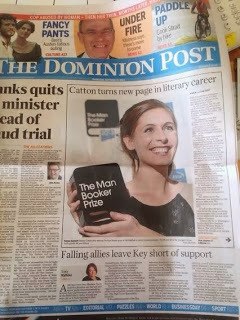
Yesterday I found a livestream of BBC World so I could watch the announcement of the winner of the 2013 Man Booker Prize. I also had Twitter open. There was a strange sense of community pumping out of my laptop and then Eleanor Catton went and knocked the bastard off!
One of the most impressive things has been her poise over the weeks since being short-listed and that was on display again yesterday and today. What a smart, sensible soul.
(I know some noses are out of joint about her biting back at some of the bad reviews from NZ males over the age of 45... One is normally better served holding one's tongue [eg "what review in The Press?"] but YOU JUST WON THE BOOKER, ELLIE. SAY WHATEVER THE FUNK YOU WANT.)
Anyway, last night we had our weekly salon here in the hotel (Anglophone Indian Poetry and What Literary Fiction can Learn from Commercial Fiction) and I brought along a bottle of NZ wine to toast Ellie's success. Tis a long time between drinks for NZ writers re: Booker success. Though maybe Ellie can go all Mantel/Carey and double down in quick succession.
No pressure.
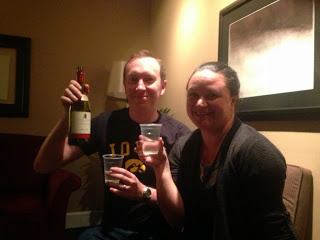 Whiti Hereaka and me (and a bunch of non-NZers out of frame)
Whiti Hereaka and me (and a bunch of non-NZers out of frame)
toasting Eleanor Catton's Booker triumph
From the Potato Barn.com
Re: my ever-so-helpful suggestions for the Iowa City Book Festival earlier in the week, you can find my panel paper on Kurt Vonnegut, and a bunch of other IWP smartness, online here.
Clayton's choice
The judges for the 2014 NZ Post Book Awards were announced today.
It's a very distinguished and savvy panel, only fitting to judge what many (including me, but I'm biased) reckon is a bumper year for Kiwi Books.
Of course, a certain Booker winner is eligible in the Fiction Category, and it'll be a major upset if it doesn't win that and the overall award. Stranger things have happened. But it seems like it'll be a scrap between the Adamses, Wilkinses, Nixons, Kidmans, Kennedys et al for the remaining spots on the short-list.
We shall see.
https://embed.spotify.com/?uri=spotif..." width="300" height="380" frameborder="0" allowtransparency="true">
Hoorah!

Yesterday I found a livestream of BBC World so I could watch the announcement of the winner of the 2013 Man Booker Prize. I also had Twitter open. There was a strange sense of community pumping out of my laptop and then Eleanor Catton went and knocked the bastard off!
One of the most impressive things has been her poise over the weeks since being short-listed and that was on display again yesterday and today. What a smart, sensible soul.
(I know some noses are out of joint about her biting back at some of the bad reviews from NZ males over the age of 45... One is normally better served holding one's tongue [eg "what review in The Press?"] but YOU JUST WON THE BOOKER, ELLIE. SAY WHATEVER THE FUNK YOU WANT.)
Anyway, last night we had our weekly salon here in the hotel (Anglophone Indian Poetry and What Literary Fiction can Learn from Commercial Fiction) and I brought along a bottle of NZ wine to toast Ellie's success. Tis a long time between drinks for NZ writers re: Booker success. Though maybe Ellie can go all Mantel/Carey and double down in quick succession.
No pressure.
 Whiti Hereaka and me (and a bunch of non-NZers out of frame)
Whiti Hereaka and me (and a bunch of non-NZers out of frame) toasting Eleanor Catton's Booker triumph
From the Potato Barn.com
Re: my ever-so-helpful suggestions for the Iowa City Book Festival earlier in the week, you can find my panel paper on Kurt Vonnegut, and a bunch of other IWP smartness, online here.
Clayton's choice
The judges for the 2014 NZ Post Book Awards were announced today.
It's a very distinguished and savvy panel, only fitting to judge what many (including me, but I'm biased) reckon is a bumper year for Kiwi Books.
Of course, a certain Booker winner is eligible in the Fiction Category, and it'll be a major upset if it doesn't win that and the overall award. Stranger things have happened. But it seems like it'll be a scrap between the Adamses, Wilkinses, Nixons, Kidmans, Kennedys et al for the remaining spots on the short-list.
We shall see.
Published on October 16, 2013 14:35
October 14, 2013
Room for improvement: Iowa City Book Festival 2013
The 2013 Iowa City Book Festival finished yesterday. This was the fifth year it has run, though things were a bit different from previous years (eg including writers from the International Writing Program on panel discussions with American writers) and it felt very much a work in progress.
To be blunt, it was the most poorly organised literature festival I’ve ever attended, either as an audience member or a participant. Granted, it’s the first such event I’ve been to in the U.S., but British, Australian and New Zealand festivals far outstrip Iowa City’s, at least organisationally. This is cause for concern when Iowa City endlessly trumpets itself as a UNESCO City of Literature and, I'm told, the four-day event receives a lot of money from said organisation and other corporate sponsors.
I’ve already given verbal feedback to some of the people involved so that improvements can be made next year, but thought I might as well lay it all down here. Maybe others involved in the festival biz will find it useful. Or perhaps it will fill them with a sense of smugness that causes them to rest on their laurels: ‘Oh, fuck it, we’re still gonna be better than Iowa City’s festival.’ Hopefully not. You laurel-resters should go read Dolores Montenegro’s piece on ‘The Problem with[UK] Literary Festivals’ at The NewStatesman.
Some observations/suggestions Panel discussions need moderators/chair-people. It seems someone realised this midway through Saturday, but the interim solution of asking one of the American writers on the panel to be the moderator is not acceptable. It’s a tricky position to be in, and sadly some writer-moderators took the opportunity to dominate the conversation/plug their own books, or completely exempted themselves from giving their own view and only asked questions. Of course, some juggled both rolls well, but still.
And the world before writer-moderators? A total shambles. Again, it wasn’t the writer’s fault and every panel had its good moments. But some panels went fifteen minutes over time because no-one was there to tell them when to stop (sadly, they seemed to run out of things to say right around when they should have ended). Not good. Not good.
Having volunteers read out the panel topic, the participant bios and sponsor names is not having a moderator. Most of the volunteers read their scripts poorly/inaudibly, were not able to help with microphones or other technical issues and left as soon as the panel started. For a festival with deepish pockets, it’s shocking to place volunteers, writers and audiences in this position.
All rooms should be equipped with sound systems and mics, given more than half of any audience will be retirement age. The Old Capitol Mall room was without any audio equipment. At the three sessions I saw at the Library there were three different forms of microphone (lapel mics, table-mics, hand-held mic). Neither space had a dedicated technical person. My 4pm session at the library was the last of the day – initially it appeared there were NO MICS left. Eventually we found the hand-held. One pass-around mic is not conducive to a flowing panel discussion or Q&A with the audience. (The session itself was pretty good, I think, despite these challenges.)
Sort out the timetabling. All the panels took place on one day: Saturday 12 October. Usually there were four things to choose from (2 panels and 2 readings). That's too much, I reckon. The venues weren’t that close together and most panels ran over-time so people who wanted to go from something at the Old Capitol Mall to the Iowa City Public Library either missed the first 5 minutes or just skipped the next session altogether.
It's only three blocks distance, but writers should not be booked to give a reading at the Old Capitol at 3pm, then appear on a panel at 4pm at the library.
Make the venues easy to find and negotiate. The Old Capital Mall room was particularly hard to find, and looked a mess by mid-day with chairs all clumped together in the centre of the room like the great Pacific garbage patch. Someone needs to be responsible for each room/venue throughout the day.
The festival program and website should list international writers on equal footing with American writers. IWP writers were not given a bio in the printed program. American writers were. Photos of participating American writers featured on the festival's website, photos of international writers did not. A typical panel intro (okay, mine) read:
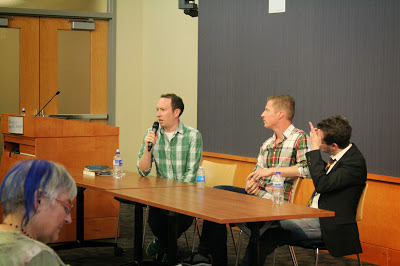 The Vonnegut Effect panel... which was generally well received. Make sure IWP writers know about the opening night reception for writers. Apparently we got told about this in an email from the IWP, but it was only one bullet point among many and was easily missed. The reception wasn’t included in our weekly timetables (with 1-4 things on every day for 10 weeks, these become our bibles) and we never received any correspondence directly from the festival. As a result, only 4 IWP writers went to the reception, despite there being name-tags for 34 of us waiting at the entrance to the event. I’m embarrassed by this and I shouldn't be the only one. I wish I’d been there. One of the things the IWP struggles with is connecting its international writers with American writers (even those still in the writer's workshop).
The Vonnegut Effect panel... which was generally well received. Make sure IWP writers know about the opening night reception for writers. Apparently we got told about this in an email from the IWP, but it was only one bullet point among many and was easily missed. The reception wasn’t included in our weekly timetables (with 1-4 things on every day for 10 weeks, these become our bibles) and we never received any correspondence directly from the festival. As a result, only 4 IWP writers went to the reception, despite there being name-tags for 34 of us waiting at the entrance to the event. I’m embarrassed by this and I shouldn't be the only one. I wish I’d been there. One of the things the IWP struggles with is connecting its international writers with American writers (even those still in the writer's workshop).
I’ve just been complaining about feeling like a second class festival participant, but going to this reception and meeting the American writers and having a glass of wine would ameliorate any programming slight. One of the IWP writers who didstumble into the reception managed to meet his fellow panellists and they got to discuss their topic in advance. This panel, I’m told, was one of the smoother events. Surprise, surprise.
Figure out what to do about IWP writers being heavily prepared and American writers winging it. Given English isn’t the first-language of most of the IWP writers, all of us (even those who only speak English) had to write a paper on the panel topic in advance. It makes sense that the non-English speakers have the safety net of a pre-written, copy-edited piece that they can deliver if they wish. It also makes sense that these writers can choose to simply participate in a panel discussion with their American peers like normal human beings. Where things got awkward on Saturday was when IWP writers felt pressured into not reading their panel papers, and thus struggled to keep up with the panel discussion (which inevitably got bogged down without a moderator to direct the conversation and ensure everyone got to contribute).
The bigger problem, though, was the contribution of the American writers. They rolled into town knowing they’d do a reading and sit on a panel, but few had given the panel topics any forethought. The topics generally weren’t suited to the kind of self-promotional faff you can get away with at most festivals (I've done the 'emerging writer' panel enough to know faff when I see it), and the Americans fell back on platitudes or tried to come up with a position aloud (there’s a reason most writers don’t compose their work ‘live’). The poor showing of the Americans was brought into greater relief due to the fact the IWP writers were over-prepared thanks to their panel papers. Many of IWPers killed it, in my view, but I'm biased.
The solution? Well, making sure all writers are at the opening night reception and get introduced to their fellow panellists would be a start. Even a brief chat about the next day's topic would get the Americans thinking a bit more in advance. Having canny moderators would also help. A lot. And those panel papers the IWP participants had to write? Why not give them to the moderator and the American writers a couple of days in advance. Doesn’t that sound sensible? And if someone wants to read their paper like its a literature conference rather than a festival - let them, because it's bound to be insightful, brief and on-topic. Remember you're a book festival. I find it very strange that the marquee event on Thursday night “An Evening with the Lacks Family: The Story Behind The Immortal Life of Henrietta Lacks” took place without the author of the book, Rebecca Skloot (apparently she pulled out months in advance but the session went ahead). Very odd. Couldn't this event waited till next year when Skloot was available? Also, a couple of American writers asked me about the book sales table. I noticed Prairie Lights' table in the Ped Mall had most of the American participants' books, but there was never any mention that, hey, you can buy these people's books if you want. Nor was there a signing table. This wasn't such a big issue for writers like me who don't have US publishers for physical books (NB: all my stuff is available worldwide if eBooks floats your boat), but I know it put a few American noses outta joint. - So yes, there are many things that could have been done better, and I’ve already heard encouraging sounds from people who can make these mostly simple improvements. Cool. It was still a fun festival in many ways. I even bought the t-shirt, so it was far from a complete disaster. May it build on its strengths for next year and beyond.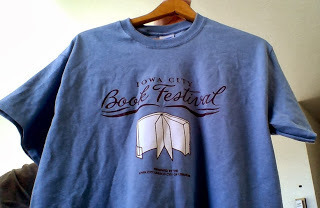
To be blunt, it was the most poorly organised literature festival I’ve ever attended, either as an audience member or a participant. Granted, it’s the first such event I’ve been to in the U.S., but British, Australian and New Zealand festivals far outstrip Iowa City’s, at least organisationally. This is cause for concern when Iowa City endlessly trumpets itself as a UNESCO City of Literature and, I'm told, the four-day event receives a lot of money from said organisation and other corporate sponsors.
I’ve already given verbal feedback to some of the people involved so that improvements can be made next year, but thought I might as well lay it all down here. Maybe others involved in the festival biz will find it useful. Or perhaps it will fill them with a sense of smugness that causes them to rest on their laurels: ‘Oh, fuck it, we’re still gonna be better than Iowa City’s festival.’ Hopefully not. You laurel-resters should go read Dolores Montenegro’s piece on ‘The Problem with[UK] Literary Festivals’ at The NewStatesman.
Some observations/suggestions Panel discussions need moderators/chair-people. It seems someone realised this midway through Saturday, but the interim solution of asking one of the American writers on the panel to be the moderator is not acceptable. It’s a tricky position to be in, and sadly some writer-moderators took the opportunity to dominate the conversation/plug their own books, or completely exempted themselves from giving their own view and only asked questions. Of course, some juggled both rolls well, but still.
And the world before writer-moderators? A total shambles. Again, it wasn’t the writer’s fault and every panel had its good moments. But some panels went fifteen minutes over time because no-one was there to tell them when to stop (sadly, they seemed to run out of things to say right around when they should have ended). Not good. Not good.
Having volunteers read out the panel topic, the participant bios and sponsor names is not having a moderator. Most of the volunteers read their scripts poorly/inaudibly, were not able to help with microphones or other technical issues and left as soon as the panel started. For a festival with deepish pockets, it’s shocking to place volunteers, writers and audiences in this position.
All rooms should be equipped with sound systems and mics, given more than half of any audience will be retirement age. The Old Capitol Mall room was without any audio equipment. At the three sessions I saw at the Library there were three different forms of microphone (lapel mics, table-mics, hand-held mic). Neither space had a dedicated technical person. My 4pm session at the library was the last of the day – initially it appeared there were NO MICS left. Eventually we found the hand-held. One pass-around mic is not conducive to a flowing panel discussion or Q&A with the audience. (The session itself was pretty good, I think, despite these challenges.)
Sort out the timetabling. All the panels took place on one day: Saturday 12 October. Usually there were four things to choose from (2 panels and 2 readings). That's too much, I reckon. The venues weren’t that close together and most panels ran over-time so people who wanted to go from something at the Old Capitol Mall to the Iowa City Public Library either missed the first 5 minutes or just skipped the next session altogether.
It's only three blocks distance, but writers should not be booked to give a reading at the Old Capitol at 3pm, then appear on a panel at 4pm at the library.
Make the venues easy to find and negotiate. The Old Capital Mall room was particularly hard to find, and looked a mess by mid-day with chairs all clumped together in the centre of the room like the great Pacific garbage patch. Someone needs to be responsible for each room/venue throughout the day.
The festival program and website should list international writers on equal footing with American writers. IWP writers were not given a bio in the printed program. American writers were. Photos of participating American writers featured on the festival's website, photos of international writers did not. A typical panel intro (okay, mine) read:
In conjunction with a visit by a traveling exhibit from the Kurt Vonnegut Memorial Library in Indianapolis, Andrew Sean Greer and Charles Blackstone will discuss the ongoing impact of one-time University of Iowa Writers’ Workshop instructor Vonnegut on the world of letters. They will be joined by International Writing Program participant Craig Cliff (New Zealand).It’s as if I was only allowed on the panel by some grand diplomatic gesture or some heavy arm-twisting by the IWP. Even if this is true, try and hide it better. After sitting in the audience for four panels and talking to other audience members, the international writers more than held their own. (More on this shortly.) It's really a great point of difference for your festival. But you need to start treating non-American writers like they're valued, even if you aren't paying them...
 The Vonnegut Effect panel... which was generally well received. Make sure IWP writers know about the opening night reception for writers. Apparently we got told about this in an email from the IWP, but it was only one bullet point among many and was easily missed. The reception wasn’t included in our weekly timetables (with 1-4 things on every day for 10 weeks, these become our bibles) and we never received any correspondence directly from the festival. As a result, only 4 IWP writers went to the reception, despite there being name-tags for 34 of us waiting at the entrance to the event. I’m embarrassed by this and I shouldn't be the only one. I wish I’d been there. One of the things the IWP struggles with is connecting its international writers with American writers (even those still in the writer's workshop).
The Vonnegut Effect panel... which was generally well received. Make sure IWP writers know about the opening night reception for writers. Apparently we got told about this in an email from the IWP, but it was only one bullet point among many and was easily missed. The reception wasn’t included in our weekly timetables (with 1-4 things on every day for 10 weeks, these become our bibles) and we never received any correspondence directly from the festival. As a result, only 4 IWP writers went to the reception, despite there being name-tags for 34 of us waiting at the entrance to the event. I’m embarrassed by this and I shouldn't be the only one. I wish I’d been there. One of the things the IWP struggles with is connecting its international writers with American writers (even those still in the writer's workshop).I’ve just been complaining about feeling like a second class festival participant, but going to this reception and meeting the American writers and having a glass of wine would ameliorate any programming slight. One of the IWP writers who didstumble into the reception managed to meet his fellow panellists and they got to discuss their topic in advance. This panel, I’m told, was one of the smoother events. Surprise, surprise.
Figure out what to do about IWP writers being heavily prepared and American writers winging it. Given English isn’t the first-language of most of the IWP writers, all of us (even those who only speak English) had to write a paper on the panel topic in advance. It makes sense that the non-English speakers have the safety net of a pre-written, copy-edited piece that they can deliver if they wish. It also makes sense that these writers can choose to simply participate in a panel discussion with their American peers like normal human beings. Where things got awkward on Saturday was when IWP writers felt pressured into not reading their panel papers, and thus struggled to keep up with the panel discussion (which inevitably got bogged down without a moderator to direct the conversation and ensure everyone got to contribute).
The bigger problem, though, was the contribution of the American writers. They rolled into town knowing they’d do a reading and sit on a panel, but few had given the panel topics any forethought. The topics generally weren’t suited to the kind of self-promotional faff you can get away with at most festivals (I've done the 'emerging writer' panel enough to know faff when I see it), and the Americans fell back on platitudes or tried to come up with a position aloud (there’s a reason most writers don’t compose their work ‘live’). The poor showing of the Americans was brought into greater relief due to the fact the IWP writers were over-prepared thanks to their panel papers. Many of IWPers killed it, in my view, but I'm biased.
The solution? Well, making sure all writers are at the opening night reception and get introduced to their fellow panellists would be a start. Even a brief chat about the next day's topic would get the Americans thinking a bit more in advance. Having canny moderators would also help. A lot. And those panel papers the IWP participants had to write? Why not give them to the moderator and the American writers a couple of days in advance. Doesn’t that sound sensible? And if someone wants to read their paper like its a literature conference rather than a festival - let them, because it's bound to be insightful, brief and on-topic. Remember you're a book festival. I find it very strange that the marquee event on Thursday night “An Evening with the Lacks Family: The Story Behind The Immortal Life of Henrietta Lacks” took place without the author of the book, Rebecca Skloot (apparently she pulled out months in advance but the session went ahead). Very odd. Couldn't this event waited till next year when Skloot was available? Also, a couple of American writers asked me about the book sales table. I noticed Prairie Lights' table in the Ped Mall had most of the American participants' books, but there was never any mention that, hey, you can buy these people's books if you want. Nor was there a signing table. This wasn't such a big issue for writers like me who don't have US publishers for physical books (NB: all my stuff is available worldwide if eBooks floats your boat), but I know it put a few American noses outta joint. - So yes, there are many things that could have been done better, and I’ve already heard encouraging sounds from people who can make these mostly simple improvements. Cool. It was still a fun festival in many ways. I even bought the t-shirt, so it was far from a complete disaster. May it build on its strengths for next year and beyond.

Published on October 14, 2013 16:16
October 7, 2013
Images of America, part 2 (Iowa with a literary bent)
To be viewed with musical accompaniment... IWP #2 [Spotify playlist]
 The Mercy Hospital - this sign supposedly inspired Denis Johnson's short story 'Emergency'
The Mercy Hospital - this sign supposedly inspired Denis Johnson's short story 'Emergency'
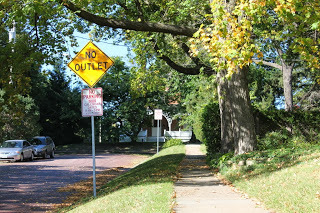 The house (at the end of Van Buren) where Kurt Vonnegut found an outlet (despite the sign)
The house (at the end of Van Buren) where Kurt Vonnegut found an outlet (despite the sign)
for his Dresden experiences (Slaughter House Five)
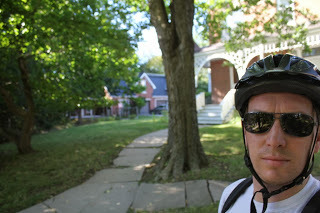 Safety-first selfie in front of Kurt's one-time abode.
Safety-first selfie in front of Kurt's one-time abode.
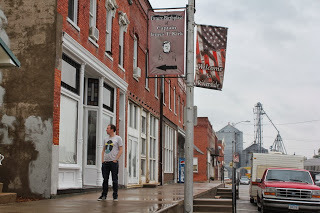 Riverside, Iowa, future birthplace of Captain James T Kirk
Riverside, Iowa, future birthplace of Captain James T Kirk
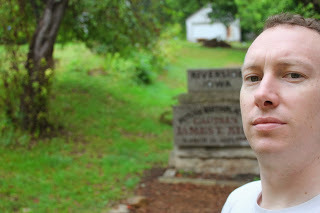 Kind of odd that the marker for his future birth site looks like a tombstone...
Kind of odd that the marker for his future birth site looks like a tombstone...
I'm sure they'll still appreciate selfies in 2228.
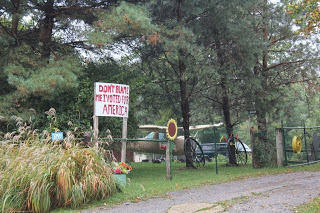 Don't blame me, I didn't vote for anyone
Don't blame me, I didn't vote for anyone
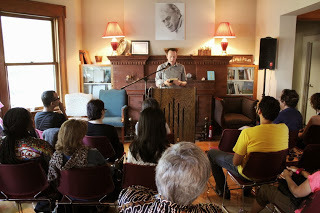 My reading at Shambaugh House
My reading at Shambaugh House
(I read 'Manawatu' and bits of '30 Ways of Looking at Marumaru South')
 The Mercy Hospital - this sign supposedly inspired Denis Johnson's short story 'Emergency'
The Mercy Hospital - this sign supposedly inspired Denis Johnson's short story 'Emergency' The house (at the end of Van Buren) where Kurt Vonnegut found an outlet (despite the sign)
The house (at the end of Van Buren) where Kurt Vonnegut found an outlet (despite the sign) for his Dresden experiences (Slaughter House Five)
 Safety-first selfie in front of Kurt's one-time abode.
Safety-first selfie in front of Kurt's one-time abode. Riverside, Iowa, future birthplace of Captain James T Kirk
Riverside, Iowa, future birthplace of Captain James T Kirk Kind of odd that the marker for his future birth site looks like a tombstone...
Kind of odd that the marker for his future birth site looks like a tombstone... I'm sure they'll still appreciate selfies in 2228.
 Don't blame me, I didn't vote for anyone
Don't blame me, I didn't vote for anyone
 My reading at Shambaugh House
My reading at Shambaugh House(I read 'Manawatu' and bits of '30 Ways of Looking at Marumaru South')
Published on October 07, 2013 14:04
September 12, 2013
Iowa Daze, or Cardinal Sin
IWP Playlist #1: Albatross to Albatross
It's been a month, I think, since I got here. Time is thick in the summer heat. Days are waded through. Weeks zip by. I'm not being hugely productive, but I am being acquisitive: buying books, borrowing books, reading books, going to readings, going to Q&As, going to the rodeo, the lake, the mall, Walmart, diners, dinners, parties, concerts, taking photos of cute rodents and iconic birdies...
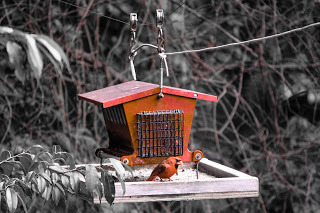
I haven't blogged because 1) I'm carving 500-word slivers off this experience for my Dom Post column (last Saturday: fashion in Iowa; next one: rodeo) and 2) I think I need to give these experiences more time and shape than a blogpost demands. So cold comfort for impatient blog-readers, but I am having fun, I am thinking and drinking deeply from this Midwestern oasis. I am working, even if it doesn't always look like it, even to me.
It's been a month, I think, since I got here. Time is thick in the summer heat. Days are waded through. Weeks zip by. I'm not being hugely productive, but I am being acquisitive: buying books, borrowing books, reading books, going to readings, going to Q&As, going to the rodeo, the lake, the mall, Walmart, diners, dinners, parties, concerts, taking photos of cute rodents and iconic birdies...

I haven't blogged because 1) I'm carving 500-word slivers off this experience for my Dom Post column (last Saturday: fashion in Iowa; next one: rodeo) and 2) I think I need to give these experiences more time and shape than a blogpost demands. So cold comfort for impatient blog-readers, but I am having fun, I am thinking and drinking deeply from this Midwestern oasis. I am working, even if it doesn't always look like it, even to me.
Published on September 12, 2013 14:17
September 5, 2013
Images of America, part 1
Yesterday I took my camera with me on my bike journey home from Iowa House to Coralville...
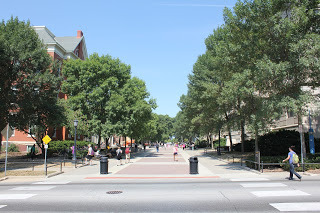 University life
University life
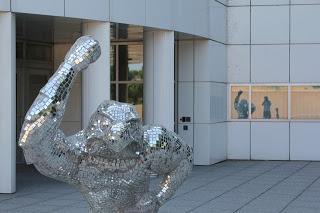 Herky and me
Herky and me
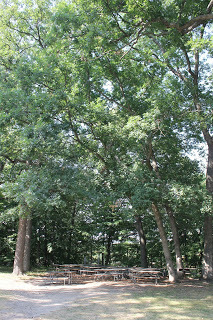 Picnic tables
Picnic tables
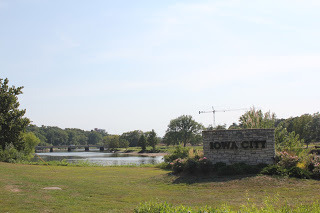 Signage
Signage
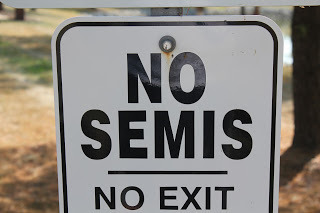 Go hard or go home
Go hard or go home
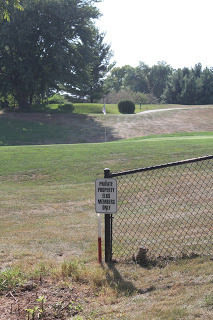 (The pins sport US flags)
(The pins sport US flags)
 Postal
Postal
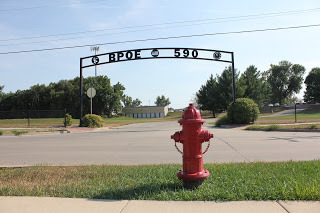 Hydrant / Secret Elk codes
Hydrant / Secret Elk codes
 Mackinaw Village (not a real village)
Mackinaw Village (not a real village)
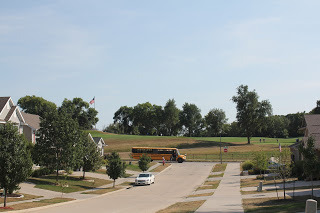 School bus
School bus
 U-Haul
U-Haul
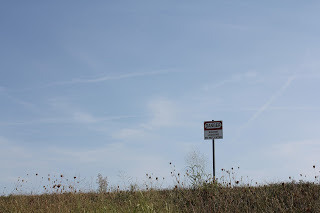 Danger sign
Danger sign
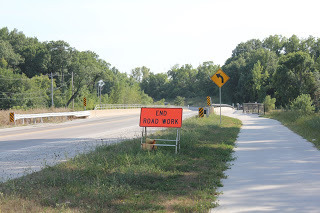 Protest sign
Protest sign
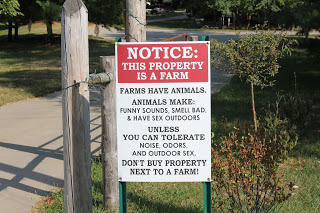 Public notice
Public notice
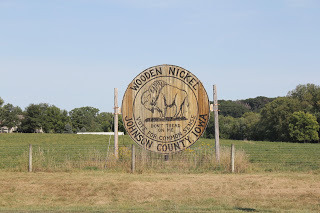 Big money
Big money
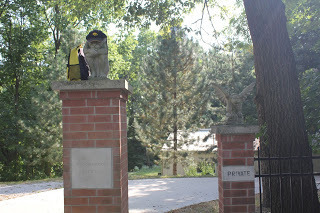 Hawkeye pride
Hawkeye pride
 University life
University life Herky and me
Herky and me Picnic tables
Picnic tables
 Signage
Signage Go hard or go home
Go hard or go home (The pins sport US flags)
(The pins sport US flags) Postal
Postal Hydrant / Secret Elk codes
Hydrant / Secret Elk codes Mackinaw Village (not a real village)
Mackinaw Village (not a real village) School bus
School bus U-Haul
U-Haul
 Danger sign
Danger sign Protest sign
Protest sign Public notice
Public notice Big money
Big money Hawkeye pride
Hawkeye pride
Published on September 05, 2013 10:59
August 12, 2013
This ends the New Zealand portion of our programme
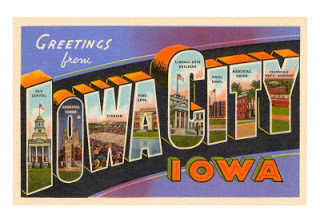 ...almost.I'm off to the States tomorrow. WLG - AKL - LAX. We're having a 2-night layover in Los Angeles (wise, methinks, given the 7.5 month-old in our party) before getting to Iowa City (via Dallas and Cedar Rapids).
...almost.I'm off to the States tomorrow. WLG - AKL - LAX. We're having a 2-night layover in Los Angeles (wise, methinks, given the 7.5 month-old in our party) before getting to Iowa City (via Dallas and Cedar Rapids).The travel trauma should rule a nice thick line under the first few weeks of The Mannequin Makers' life in the big bad world. I'm looking forward to fully immersing myself in the International Writing Program at the University of Iowa and writing some butt-kicking stories.
But for now it's probably worthwhile just noting down how The Mannequin Makers has fared thus far.
Sales
Well, it was #4 on the bestseller list in its first week. Okay, so the New Zealand Fiction list is quite a specific category, but A Man Melting never made it to the top 10... The Mannequin Makers also made #5 on the list of all books sold at independent books stores in New Zealand for the week.
The eagle-eyed among you may have noticed how a certain book is #1 and #2 of both lists (paperback and hardback). Feel free to bump me up a spot if you think that's cheating (I don't - in the great wash-up it's pretty cool to be fighting for airtime with a favourite for the Booker Prize).
One last musing on sales... It'll be interesting to see how things go in the coming weeks. Whitcoulls is selling The Mannequin Makers for $30, $8 off the R.R.P. They'd even moved it up from the "What's New" table near the back of the Lambton Quay store to the "What's Hot" table near the entrance. Which is all good (especially since Whitcoulls never bothered to stock my last book except for in airports), but Whitcoulls is no longer signed up to Nielsen Bookscan, which is used to compile the bestseller lists.
I'm just gonna forget about all that sales stuff until my next royalties statement comes through in March-ish next year.
Reviews
I've seen seven reviews so far, and apparently there's one in the new North & South which came out today, but they didn't have it at Countdown yet.
(All I know is what RHNZ tweeted: 'In THE MANNEQUIN MAKERS, @Craig_Cliff “has crafted a brilliantly structured and evocative story.”' Sounds promising, but you can never trust those publishing types and their money quotes.)
The other reviews have been:
The Listener, 1 August 2013
Highly favourable. Money quote: "it’s tremendous, darkly entertaining and original from start to finish."
The Press, 3 August 2013 (not online)
Highly unfavourable. Money quote is an indignant text from my father-in-law in Christchurch: "Who the hell is Phillip Matthews?"
Radio New Zealand (Nine to Noon), 7 August 2013Mostly favourable (didn't like the fourth part as much as the others). Money quote: [the bit where she gives away why the Carpenter is mute, and about six other meaty plot points].
The Hoopla, 9 August 2013Highly favourable. My first Australian review (for any book), that I'm aware of. Money quote: "This is a superb novel of parental obsession, the lure of the unattainable and the tragedy inherent within human nature." ALso, the bit where she compares TMM to Peter Carey's Oscar and Lucinda and Tim Winton's Cloud Street. Nice company, I reckon.
SwampThing, 9 August 2013Highly favourable. Money quote: "Much like his craftsmen, Kemp and the Carpenter, Cliff has crafted a lovely bit o' story – well built and polished."
The Australian, 10 August 2013Highly mixed (if that's a thing). Money quote: This twitter exchange, where bookseller Martin Shaw managed to draw both the reviewer and me into a conversation about the review... Ha!
[View the story "Ambitious debut goes out on a limb" on Storify]Also of note: the fact I was compared to Peter Carey again (though this time it was meant to be disparaging). If that's the mud people wanna sling, I've no fear sticking my head above the parapet!
Aside: until this week, I'd only been compared to Peter Carey once before. It was in Sydney and I blogged about it:
When I said it was an honour to meet him [Tom Keneally], he said, “I am reminded of another young short story writer who approached me with reverence many years ago... who turned out to be Peter Carey. If I can offer one piece of advice: One booker is an honour; two is just an indulgence.”Otago Daily Times, 10 August 2013
Mostly favourable (found Part Three a bit long: "just another shipwreck story", but liked the other parts). Money quote: "With The Mannequin Makers [readers are] being treated to a tale that has characters and a plotline even Dickens would have been proud of."
Also, right at the end: "Let's hope it sells a few copies and stirs the interest of TV drama and film-makers." To this I would add, "Just a few?" and "TV drama and film-makers, my people are waiting by the phone."
If you've seen any other reviews, lemme know and I'll hunt them down (though that might be hard in the States).
Other publicity
I wrote about my uneasy relationship with historical fiction for the New Zealand Book Council.
I did this interview with Lynn Freeman, which ran on the Arts on Sunday (4 August) on Radio National.
I did an event at the Palmerston North City Library (a place that used to be a department store, and I've previously described as my spiritual home as a writer) on Sunday 11 August.
There's an interview with Joan Fleming/The Lumiere Reader that should be online in the next day or so.
There'll also be a write-up about me in the Herald on Saturday 24 August (I think). And something in APN's regional newspapers one day soon (if I haven't already missed it).
And now...
To read through the 30 or so stories for the BNZ Literary Awards (Novice Category) that have made my longlist. There were 607 entries in total, and I'm hoping to trim down to 12 or 15 that I'll take with me to the states and mull over for a few days before I make my final decision.
And then pack... 16 hours to my first flight leaves. Better hop to it.
Published on August 12, 2013 01:30
August 2, 2013
Night at the Department Store: the launch of The Mannequin Makers
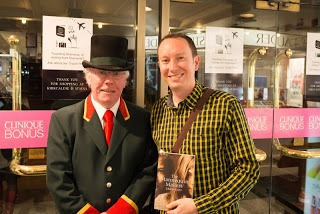 The doorman and me (good product placement, eh?)Wednesday night I launched The Mannequin Makers at Kirkcaldie and Stains, a Wellington department store/institution that is celebrating its 150th year.
The doorman and me (good product placement, eh?)Wednesday night I launched The Mannequin Makers at Kirkcaldie and Stains, a Wellington department store/institution that is celebrating its 150th year.Here's an excerpt from my speech:
Some people have asked, “Why Kirks?” Beyond the fact I thought they might let me borrow a few mannequins, I’ve always been drawn to department stores. Maybe it was the fact my nana worked as a curtain maker at a department store in Palmerston North. Maybe it was the way Ian Athfeild transformed the town’s old DIC store into the new public library, where I did a lot of my growing up, or at least my growing into books. Maybe I watched the movie Mannequin at too impressionable an age. Maybe it’s that anachronistic vibe proper department stores have. I’m sure the stock has changed a lot in the last 150 years, but there’s something pleasingly still and unhurried about walking around a place like Kirkcaldie and Stains.
So here we all are, in this mini-time warp, to listen to me babble on about a novel — how very Twentieth Century!
But we mustn’t despair. It has been an exciting week for New Zealand books and writers, after all.
Last week, John Campbell, acting as chief judge of the New Zealand Post Book Awards said a couple of interesting things.
The first: "Literature is not baby food, it doesn't have to appeal to everyone."
While I agree with the sentiment — and hold in my hands a book, if you’ll allow me to skite, with a profound capacity to disappoint — I question the analogy as someone who spends a lot of time covered in baby food. Anyone who scans the baby food isle at the supermarket these days will be met with flavours such as “Moroccan Lamb and cous cous” “Minted peas and polenta” “Cauliflower, Broccoli and Cheddar” — the last of these I can say without doubt is not to everyone’s taste, at least not a certain seven-and-a-half-month-old’s.
But I can unreservedly agree with something else John Campbell said. That it is, “a tremendously exciting time for New Zealand literature.” I say that as a reader, first and foremost.
Last time I did this, on the first of July 2010, I’d just gotten engaged. Now I stand before you married with a kid, a mortgage and a cholesterol problem... This book really took its toll on me. When I finished I was 10 kgs overweight, I needed glasses, and though I’m not quite sure how, I’m blaming all my recent dental bills on this book as well. But I got through, and it’s time to thank the people who helped get me here…I wasn't quite sure how the space would work out. We were upstairs in the exhibition space (also known as the Christmas Sales space), though the drinks table was set up outside among the furniture. The fancy crockery that had been on display was pushed to the sides of the exhibition space and just invited to be knocked over or nicked... in all Kirks were very trusting and accommodating. And two mannequins were set up in the space, which was cool.
But the x-factor came from the eeriness of being in a department store long after closing. It was a bit Night at the Museum, or, dare I say it, that montage scene in Mannequin.
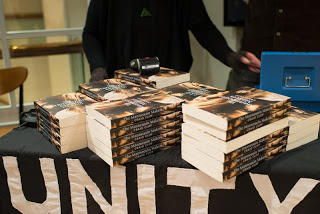 At the end of the night we filed out through the vacant store, echoing the scene in The Mannequin Makers when Avis is stolen from the window... But I've said too much already!
At the end of the night we filed out through the vacant store, echoing the scene in The Mannequin Makers when Avis is stolen from the window... But I've said too much already!Tilly and Matt from Unity Books did a roaring trade on the night, even selling out of the copies of my first book that they brought along (mostly to colleagues who started working with me since my last launch and never got around to buying A Man Melting).
And to top things off, the first review is in and it's rather nice.
The whole review is currently behind the Listener's paywall, but will be on newstands next week."This is an engaging and deadly smart novel... The Mannequin Makers lives up to its cover blurb billing Cliff as a talent to watch – it’s tremendous, darkly entertaining and original from start to finish."— Sam Finnemore, The Listener
Let's keep this ball rolling, eh? Only 11 days till I leave the country (and you can publish all the lousy reviews you want!).
Published on August 02, 2013 01:30
July 30, 2013
A long time between drink: Launch Day 2013
 For every launch, there will be collateral damage.It’s been 1126 days since my last book launch. Or 27,024 hours.
For every launch, there will be collateral damage.It’s been 1126 days since my last book launch. Or 27,024 hours.Sometimes it has felt like a very long time. As if my book was taking forever.
Now, as the act of writing slowly recedes into memory, and those 27,024 hours between launches begins to telescope into a single, easy figure (“about 3 years”), it doesn't seem that long.
In an alternate universe I could have written one word every 15 minutes from the moment my last book launch wound down and I’d only be writing the final word of the novel (“am”) as the clock strikes six tonight. (I'd then have to improvise the Acknowledgements page.)
The reality of composition, of course, is different, but something about this equation makes sense. There’ve been few waking hours in recent years that I haven’t thought about “my next book” (sadly, I wasted the first year trying to write something the wrong next book).
And there’ll be few waking hours the rest of my life where I’m not thinking about my new "next book".
All I need to do is keep placing one word after another.
And in 160 weeks, give or take, I’ll have this same wonderful knot in my stomach.
My book is dead, long live my book.
More on The Mannequin Makers
A playlist for the novel (and the launch)
Location Guides: Part One (Marumaru), Part Two (Antipodes Islands), Part Three (Crossman's Gully)
The editing process
Published on July 30, 2013 10:46
July 29, 2013
The Mannequin Makers Playlist
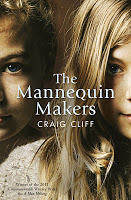 It's that time again. Time for a Largehearted Boy-esque playlist for my new book, The Mannequin Makers.
It's that time again. Time for a Largehearted Boy-esque playlist for my new book, The Mannequin Makers.You can check out my playlist for my short story collection, A Man Melting, here. Back in 2010 I picked a song for each of the 18 stories, and the range of artists (Van Halen, Paul Simon, Gene Kelly, The Go-Betweens, The National, Los Fabulosos Cadillacs, Milli Vanilli) reflects the diversity of the collection.
A novel, of course, is supposed to be more unified. That is not to say it doesn't range widely (from Scotland to the subantarctic; from the 1860s to 1970s), but it has still resulted in a less eclectic playlist than last time, I think.
I've split my playlist into four parts to mirror the structure of the novel. The three or four songs for each part are a mix of songs I listened to often while writing, songs I came across at pivotal moments, or songs that just seem to fit that particular part of the story.
For those of you coming to my book launch tomorrow (6pm at Kirkcaldie and Stains; the doorman will let you in), these'll be the songs playing in the background as you skull your pinot and try and catch the eye of the waitress with the platter of corn fritters...
Part One: Welcome to Marumaru'Death and the Maiden' by The Verlaines
Shall we have our photo taken?
We'll look like Death and the Maiden
Great song, great band. I got into this track again via a cover by Stephen Malkmus, but the original is better.
Thematic link: the idea of posing for a photo based on a work of art. In the case of The Mannequin Makers, that art is, funnily enough, mannequins:
"Perhaps most tellingly, when a visiting photographer set up his equipment at Hercus & Barling the townsfolk chose to be immortalised performing the poses of The Carpenter’s models." (p30)'The Killing Moon' by Pavement (Echo & the Bunnymen cover)
He's a yo-yo man, always up and downSo take him to the end of his temper
Keeping the Stephen Malkmus thing going, I reckon this cover by Pavement of Echo & the Bunnymen's song is better. Or at least, I listen to it a lot more than the original.
Temporary thematic link: I wilfully misheard the line "take him to the end of his temper" as "take him to the end of this tableau" for the longest time. (The living mannequins refer to their displays in the department store window as 'tableaux'). But the creepy vibe and lyrics do sorta suit the father-villain, Colton Kemp, who's the focus of Part One.
'The Outer Skin' by Sean Donnelly (Chris Knox cover)
And it seems like nothing can penetrate through the outer skin
Crouched and cold on a slate grey day in the Southern world
Another cover. There's probably a thematic link between Colton Kemp's attempt to recreate life in the form of wooden mannequins and artists trying to breath new life into other artist's songs... but let's not get too carried away. Again, I mostly chose this track because it sounds like I think Part One reads, and I listened to Donnelly's version a lot more than Knox's (partly because Knox's version isn't available on Spotify, but Donnelly's is).
*
Part Two: The Mannequin Speaks'My Rights Versus Yours' / 'Adventures in Solitude' by the New Pornographers
Under your wheels, the hope of spring, mirage of loss, a few more things
You left your sorrow dangling, it hangs in air like a school cheer
-Less than forget but more than begunThe adventures in solitude never done
This is the first of several cheats. A double shot from the New Pornographers because:
I couldn't choose between these two songsthey both seem important to the novel and apropo given what takes place within its pages.I got into New Pornographers during the three years I worked on The Mannequin Makers and was lucky enough to see them live and intimate at the San Fran Bathhouse here in Wellington. Great concert. Great band.
'Pascal's Submarine' by Gordon Downie
Stumbled in to sleep's ravine
Into a dream of Pascal's Submarine
Where if you can remain quiet and still
You might escape life's fill of misery
This song actually stared be towards Blaise Pascal, who supplied the epigraphs for my novel (one at the start, then one for each of the four parts). The epigraph to Part Two "... all man's misery stems from a single cause, his inability to remain quietly in one room," is reflected in Downie's song, which is really about the sinking of the Russian submarine, Kursk, in 2000.
'Eye in the Sky' by the Alan Parsons Project
The sun in your eyes
Made some of the lies worth believing
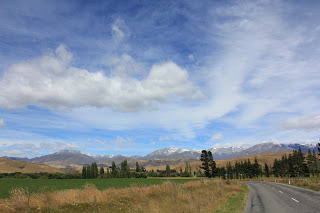
I heard this song while driving out to Cattle Creek during my research roadtrip. It was actually a double shot of Alan Parsons, with the instrumental 'Sirius' up first, followed seamlessly by 'Eye in the Sky'. I recognised 'Sirius' from Jordan-era Chicago Bulls starting five introductions, but was less familiar with the second song. Still, one listen was enough for me to be earworming it for the rest of the trip. It just seems to fit that part of the world, where Avis winds up at the end of Part Two. The vague religiosity, the keyboards, the creepiness... a perfect fit for the introduction of The Carpenter.
*Part Three: The Carpenter's Tale 'Tales of Brave Ulysses' by Cream
And you touch the distant beaches with tales of brave Ulysses,
How his naked ears were tortured by the sirens sweetly singing,
For the sparkling waves are calling you to kiss their white laced lips.
This is one of those songs I rediscovered late in the process of writing The Mannequin Makers. I was at a friend's, in charge of choosing which LPs to play. At the top of the pile was Disraeli Gears, and when 'Tales of Brave Ulysses' came on, I thought, 'Ah! This song.' I entered a note in my phone to listen to this song again when I was at home and proceded to thrash it for the next couple of months.
Part Three opens with The Carpenter lashed to the mizzen mast of a clipper ship, with a storm approaching. I was thinking about The Odyssey when I concocted this scenario, and it turns out the narrator (The Carpenter) who read a lot of epics and Penny Dreadfuls when he was younger is thinking about these kinds of stories when he starts telling his tale.
'South Australia' by The Pogues
And as we wallop round Cape Horn, heave away, haul away
You'll wish to God you've never been born, we're bound for South Australia
There are a couple of sea shanties in Part Three, one is completely invented, another is a modified version of the 'South Australia' shanty sung in the mid-late Nineteenth Century. The Pogues' song is based on the same shanty. There are dozens of versions of 'South Australia' on Spotify by a range of artists. I like the Pogues version best, hence it makes my playlist.
'Nautical Disaster' by The Tragically Hip
The selection was quick, the crew was picked in order
and those left in the water got kicked off our pantlegs
and we headed for home.
Anyone who follows this blog knows there had to be a Tragically Hip song in here. And no, a song by their frontman (see 'Pascal's Submarine') was not enough.
This song about a fictional shipwreck gets the nod for this section of the novel, which has its own fictional shipwreck.
'How to see through fog' by The Drones
And the only ever think you're goodWhen you're walking like you're made of wood
This song only came out in January 2013, but it was on high rotate as I worked through the editing process. It seemed to really fit the passages where The Carpenter is marooned in the subantarctic, and the whole figurehead/mannequin carving thing. This fan-made video featuring mannequins, zombies and blood, makes some different, but equally valid, connections.
*Part Four: The Mannequin Speaks'Lovers in a Dangerous Time' by Bruce Cockburn
Spirits open to the thrust of grace
Never a breath you can afford to waste
The award for biggest earworm during the writing on The Mannequin Makers goes to this Canadian classic. There's something addictive about the low drone of Cockburn's "Luvverrrs... in a dangerous time" at the start of the chorus.
You can probably pour over the lyrics for connections with what happens in Part Four, but I'm happy to let Bruce do the talking.
'Numb as a Statue' / 'Wanted Dead or Alive' by Warren Zevon
I'm numb as a statue
I may have to beg, borrow or steal
Some feelings from you
So I can have some feelings too
-
I am wanted dead or alive
I'm a new kind of man
I've got to survive
Another double shot, another artist who I listen to religiously. 'Numb as a statue' is pretty prefect for the narrator of Part Four (Eugen Kemp), while 'Wanted Dead or Alive', off Zevon's oft-maligned (but I kinda dig) first album captures the western feel of the journey to the hinterland.
'Murderer' by Low
You may need a murderer
Someone to do your dirty work
I listened to a lot of Low while writing The Mannequin Makers. They're this book's version of The National (who I thrashed in 2008 when working on A Man Melting): dark, repetitive songs that make for great writing music. They also fit pretty well with the M.O. of my novel (described by Random House's international rights person as "quietly horrifying", which I'm now using myself without hesitation) - 'Murderer' is a particularly good example of this and a fitting way to end my playlist.
Right, guess I have to write another book now. See you all again in three-to-five years.
Published on July 29, 2013 10:54
July 21, 2013
The Mannequin Makers Location Guide: Part Three: Crossman's Gully
What the guidebooks say
Name: Crossman's GullyNature: FictionalLocation: A day's ride (by horse) from Marumaru (also fictional, see part one).Importance in The Mannequin Makers: features in Part Two, Part Three and Part Four. Without giving away the plot, let's just say the climax happens here.Inspired by: Earthquakes (the town), Clay Cliffs, Knottingly Park Bush Hut
What the novel says
The locations in Part One and Two weren't too difficult to talk about without spoilers. I guess saying there's a shipwreck in the subantarctic is a bit of a spoiler, since it happens halfway through the book, but it's pretty clearly signalled on the back of the book.
Crossman's Gully is a bit different.
Let's just say it's a place certain characters retreat to in various times in the novel when town gets a bit too much.
The notable features of this gully are it's geography and the hut from which Avis has just emerged in the passage above.
A world of pure imagination
When I first ventured into Crossman's Gully in the first draft of Part Two of the novel, I didn't know what it looked like. I didn't even know it would have a name.
So the first draft was a bit vague. There was a hut in a gully.
Good stuff.
I knew that I'd need to flesh it out more in future drafts, and when I returned to the gully in subsequent parts of the novel.
With this in mind, I went on my road trip in late January 2012 (third time in three posts it's been mentioned... must've been important).
Clay Cliffs and Earthquakes
I blogged about my visits to Clay Cliffs and Earthquakes here. Basically, I was drawn to these places by their names. I didn't know what I'd find exactly, and certainly wasn't thinking: this can be my gully.
But when I arrived at both I thought: this can be my gully.
First up was Clay Cliffs, near Omaramara. The geology of the place was pretty interesting, but I was more struck by the view looking back through the formations to the braided river, the brown plain and the foothills.
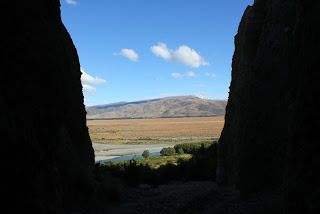
And a bit further around, you glimpse the snow-dusted Southern Alps.
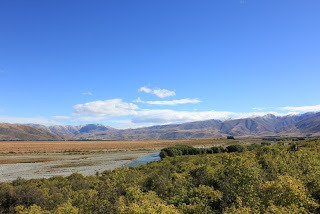
The scene I'd already written in my gully occurred in early January. I was there late January, so it was pretty similar. I began rewriting my scene in my head.
I thought I'd cracked it. I thought Clay Cliffs was enough.
Then I went to Earthquakes. And I was like, "This is my gully."
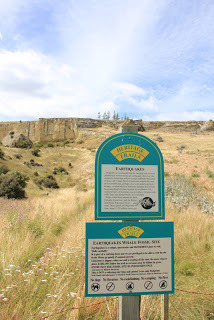
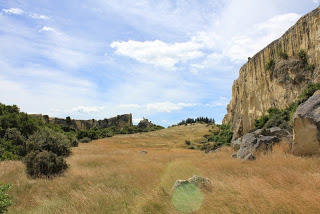
And then, when I went to Waimate, I had the final piece of the puzzle: Knottlingly Park Bush Hut, the design of which I shamelessly appropriated for the hut in my gully where events happen.
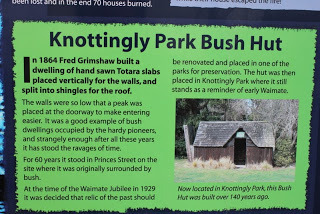
In the end, Crossman's Gully is all of these places and none of them.
Name: Crossman's GullyNature: FictionalLocation: A day's ride (by horse) from Marumaru (also fictional, see part one).Importance in The Mannequin Makers: features in Part Two, Part Three and Part Four. Without giving away the plot, let's just say the climax happens here.Inspired by: Earthquakes (the town), Clay Cliffs, Knottingly Park Bush Hut
What the novel says
"I made my way slowly to the door and eased it open. The hinges gave a creak but the man did not wake. Outside, I surveyed our destination for the first time. To my left a curving wall of rock rose up to a height of thirty feet. The rock was yellow with black tarnished edges and greenish-black vertical stripes. A collection of square-sided boulders lay at the foot of this cliff, their surface brownish-grey with pocks of the same sandy yellow. Dry, thorny bushes and larger trees with waxy green leaves sprang up from gaps between the boulders but I stood on a sort of plain with knee-high grass that swirled in the breeze like some diaphanous material. The grass was bound by another curving wall of rock perhaps forty yards away. It was as if I stood between two cupped stone hands." (p.109)Skirting around the spoilers
The locations in Part One and Two weren't too difficult to talk about without spoilers. I guess saying there's a shipwreck in the subantarctic is a bit of a spoiler, since it happens halfway through the book, but it's pretty clearly signalled on the back of the book.
Crossman's Gully is a bit different.
Let's just say it's a place certain characters retreat to in various times in the novel when town gets a bit too much.
The notable features of this gully are it's geography and the hut from which Avis has just emerged in the passage above.
A world of pure imagination
When I first ventured into Crossman's Gully in the first draft of Part Two of the novel, I didn't know what it looked like. I didn't even know it would have a name.
So the first draft was a bit vague. There was a hut in a gully.
Good stuff.
I knew that I'd need to flesh it out more in future drafts, and when I returned to the gully in subsequent parts of the novel.
With this in mind, I went on my road trip in late January 2012 (third time in three posts it's been mentioned... must've been important).
Clay Cliffs and Earthquakes
I blogged about my visits to Clay Cliffs and Earthquakes here. Basically, I was drawn to these places by their names. I didn't know what I'd find exactly, and certainly wasn't thinking: this can be my gully.
But when I arrived at both I thought: this can be my gully.
First up was Clay Cliffs, near Omaramara. The geology of the place was pretty interesting, but I was more struck by the view looking back through the formations to the braided river, the brown plain and the foothills.

And a bit further around, you glimpse the snow-dusted Southern Alps.

The scene I'd already written in my gully occurred in early January. I was there late January, so it was pretty similar. I began rewriting my scene in my head.
I thought I'd cracked it. I thought Clay Cliffs was enough.
Then I went to Earthquakes. And I was like, "This is my gully."


And then, when I went to Waimate, I had the final piece of the puzzle: Knottlingly Park Bush Hut, the design of which I shamelessly appropriated for the hut in my gully where events happen.

In the end, Crossman's Gully is all of these places and none of them.
Published on July 21, 2013 12:00



